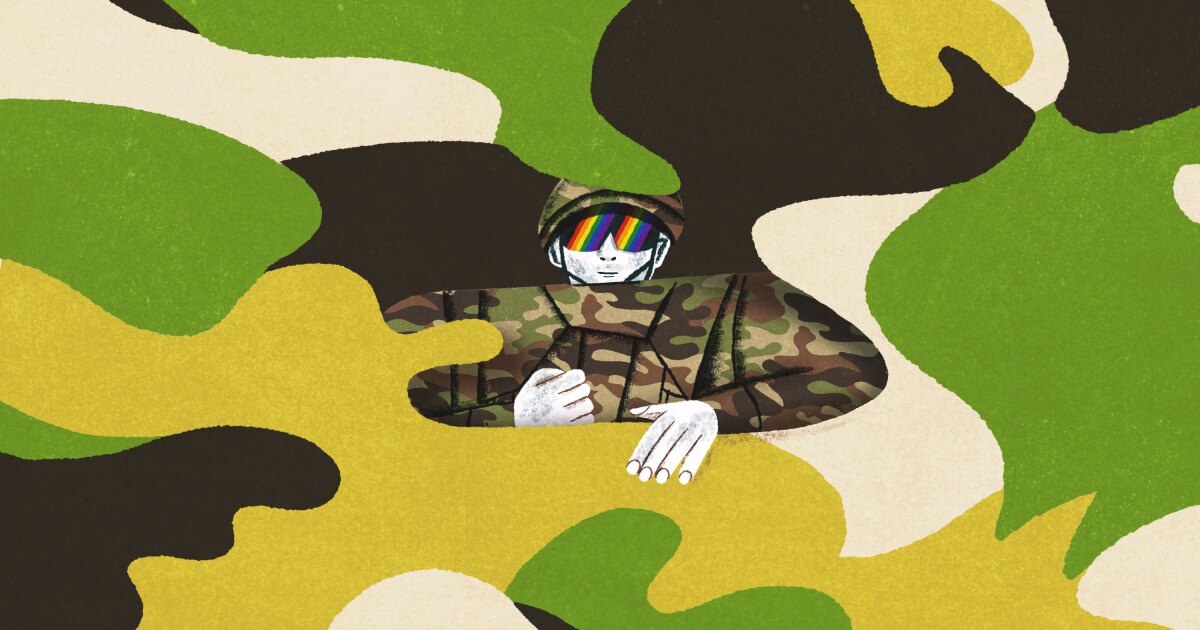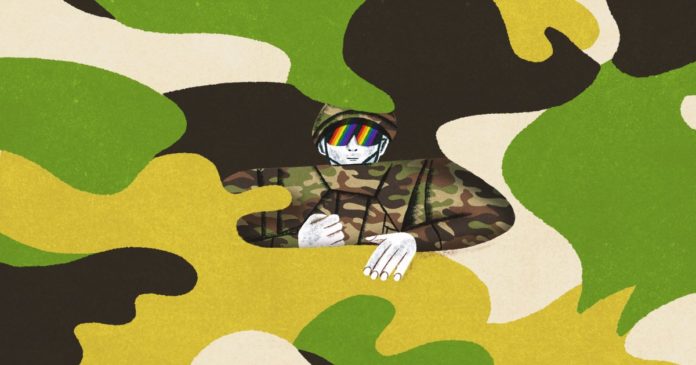
The moment my hands began to tremble, I caught the eyes of a man dancing nearby. The vibrations of the bass from the floor-to-ceiling speakers caused horrifying pain in my chest. Each beat felt like an unpleasant bang.
It was the end of 2019. The party-a strange rave in a warehouse in downtown Los Angeles-was a sea of flashing lights and moving bodies rushing around me. However, I myself was drowning in the rhythm of music, which is an almost accurate sensory match with the pulse from the improvised explosive device.
I felt a cold sensation in my legs. I crushed my solo cup and spilled a drink. My heart was a race. I was crying. And unfortunately, I was definitely out of luck with that guy who was still staring at me.
It’s been two years since I set foot on the strange dance floor. And a year has passed since the last off-base mission in Afghanistan. The time I struggled to navigate gay Los Angeles was sandwiched between two seemingly incompatible identities, queer and military. Both are important to me. I sometimes found it impossible to embody both.
Just a few days ago, I was at a party in the backyard of Echo Park, sitting around a fire hole and talking. A man in his thirties, like me, asked what it meant to “come out after the army.”
“I came out in college,” I said.
“In that case, we don’t want you,” he replied. Unmistakable Implications: After living an open and gay life, joining an institution with a long history of discrimination against the queer people represents a betrayal and rejects both my own queerness and core queer values. Did. As he believed, if I rejected that part of my identity, the queer community would have to reject me in turn.
It didn’t seem to matter that I didn’t avoid gay identity while in the army. Another problem is that I spent a year in Afghanistan volunteering to fight for the same values that many in the queer community value: minority rights, gender equality, and freedom of expression. It wasn’t. I tried to laugh at it. A few minutes later, I forgave myself through the hole in the fire and went home.
A few days later, when I stepped onto the dance floor, I wondered, “How many people don’t want me here?”
This fear of being kicked out has long been well known because it comes out closed, and I was afraid that there was an essential part of me that people would never accept. And while I’ve found an effective way to deal with that trauma for most of the decade, the underlying psychological damage was ubiquitous — hidden up to Afghanistan and on its dance floor. It reappeared and became closely related to my military experience.
It happened that my ability to effectively deal with that untreated queer trauma began to fray when faced with the additional stress of deployment. When I tried to connect the queer and military identities, my body felt like it was starting to revolt.
When I first received the physiological response I experienced on the dance floor, I had dinner in the far west of Afghanistan.
I was at Camp Arena, a NATO base managed by Italy in Herat, and had dinner with three other members of the group advising special operations in Afghanistan. We were digging some hot pizzas. We flew from Kabul earlier that day and met with a team of US Army Special Forces stationed there. We had to escort us to the convoy the next morning because of a recent battle nearby. I have already completed several missions to visit the Afghan Special Operations Battalion across the country, but this is the first time I have needed help from our own special forces to travel. did. I was worried about.
At dinner, the conversation was directed to the previous administration’s ban on transgender forces, and then to the reality of gay men and women serving openly. I came out to two of these guys a few months ago and thanked them for not making it a problem.
But the fourth man at the table, the Major of the National Guard I just met, said he was happy that the morning convoy had no homosexuals. “We really need someone who can trust this.”
The pulse has become faster. I started to sweat. Fragmented images came to my mind — college scenes, scenes beaten, kicked, and cursed for being gay. I was still hungry staring at the last slice of pizza, but no one put my hands under the table to see them shaking. I didn’t say anything.
The next day, I completed the mission without any problems. I’m gay, but I’ve found myself quite capable. The four of us were tired and bored waiting for the plane back to Kabul in the dusty tarmac, so when the new Major spoke again, we thought the conversation would run out. “Did you bring your girlfriend home?”
This was my moment.
“I was dating a man, but I broke up when I received the deployment order.”
“Man, that’s the worst. But a lot happens.” Yes, but wait. what?
Who exactly did he mean when he said he didn’t want to put gays in our convoy? Shouldn’t he be bothered by the gay man in front of him, the man sitting next to him through the disputed territory of Afghanistan?
From the day he made that comment at dinner, he apparently came to his own conclusions about me — which seemed to contradict his belief in the capabilities of gay military personnel. I proved to him that I could be a capable naval officer as well as a real homosexual. More importantly, I proved it to myself.
I drew power from that episode in Herat, which faces similar challenges at home. Managing the fear reaction of overwork in the club that night, integrating queer and veteran identities, fostering meaningful connections with peers, treating PTSD, and more. If you can join the army, you can also “come out” to your homosexual companions.
For the first time since the COVID restrictions began, I arrived at Silver Lake Akbar a few Saturday nights. It was smaller than its pre-pandemic acclaim, but still fun, weird, crowded and noisy. I was with a friend. Many of them knew why I joined the army and what my experience was. Because I shared it with them during a quiet quarantine conversation. The moment the heavy beat song played, my hands trembled, but this time I was relieved. My queer and veteran identities are beginning to coexist comfortably.
The author is a veteran of the US Navy deployed in the joint billet of the Army and NATO currently living in Echo Park. He is @charlierobs on Instagram.
LA Affairs records a romantic quest for love in all of its glorious expressions in the LA region. We want to hear your true story. You will pay $ 300 for the published essay. Email LAAffairs@latimes.com. The submission guidelines are here.








